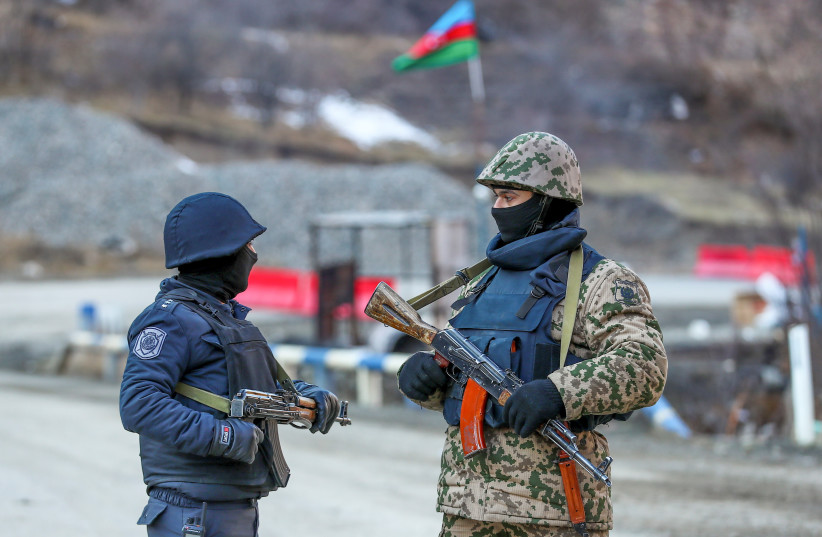If Azerbaijan were to immediately withdraw from the sovereign Armenian territory that it occupies and promise to halt further aggression the path could be cleared toward a comprehensive peace settlement with Armenia.
But you wouldn’t know that reading the recent op-ed in The Jerusalem Post by Azerbaijan’s ambassador to the UK (November 24) who avoids any mention that his country has attacked Armenia several times since 2020, the latest aggression just two months ago, and over that time it has seized around 140 square kilometers of Armenian territory.
The article starts with a reference to the Abraham Accords of 2020 and the full normalization of relations between Israel, the United Arab Emirates and Bahrain. It states that although the context in the Caucasus is different, “a similar emphasis on the dividends of peace stands as a key element in normalization between Armenia and Azerbaijan.”
Making comparisons to the Abraham Accords is a curious choice. None of the signatories occupies the land of another and since its signing two years ago the fruits of those accords make for interesting reading. Before referring to them it would make sense for Azerbaijan to mention that the UAE’s Education Ministry is preparing Holocaust learning materials for primary and secondary school students, and last year the region’s first Holocaust memorial exhibition opened in Dubai.
Thus, using the Abraham Accords as a misdirection, he tries, rather transparently, to drive an artificial wedge between Armenia and Israel: two ancient civilizations, both genocide survivor states, who continue to face existential threats to their survival. The fact of the matter is that Azerbaijan embodies the very values that are in contradiction with the letter and spirit of the Abraham Accords.

Azerbaijan wants to eliminate Armenia, Armenian identity
In Azerbaijan’s school system children are taught to hate Armenians. In one school textbook for nine to 10-year-olds a young girl is shown killing an Armenian soldier with an axe. Ironically, the ax murderer who was convicted by the Hungarian court for beheading a sleeping Armenian counterpart in Budapest is a national hero of Azerbaijan and according to the country’s ombudsman is “a symbol for the young generation.”
Azerbaijan’s ambassador also asks Armenia to stop dwelling on its past and yet his country seems determined to erase it. After years destroying thousands of Armenian religious monuments across the region which the US-based Caucasus Heritage Watch described as “a systematic, state-sponsored program of cultural erasure,” and the International Court of Justice ordered Azerbaijan to halt the destruction of Armenian heritage.
But it hasn’t stopped. For decades, various statements from Azerbaijan’s leaders are clear their intention to completely erase all traces of Armenian identity.
Make no mistake, Armenia is not an obstacle to peace but what sort of peace does Azerbaijan seek? Since the end of the Nagorno-Karabakh war in 2020, which President Aliyev admitted he launched, Armenia has accepted the five principles Azerbaijan has proposed as a basis for a settlement.
However, what Armenia guards against is Azerbaijan exploiting the border delimitation process for new territorial claims and occupation. For example, it continues to publish maps showing the south of Armenia as part of Azerbaijan. Armenia has confirmed its road network would be open for transportation between those two but that it would not whatsoever constitute an extraterritorial corridor that Azerbaijan could use as a pretext for further aggression.
The Azerbaijani ambassador’s op-ed pulses with references to normalization and the claim that “what we continue to witness is a pragmatic, reality-based Azerbaijani approach versus Armenia’s continued ideological and self-harming reluctance to become a fully integrated part of the region wherein it exists.” But as it appears, it is Armenia’s very existence with which Azerbaijan appears to have a major problem.
Furthermore, Azerbaijan’s claims to desire peace have been undermined by President Aliyev’s decision to pull out of a meeting in Brussels planned for today with Prime Minister Pashinyan, France’s President Macron and the president of the European Council, Charles Michel.
However, the same four leaders met in Prague last October where they all agreed that the quadrilateral format would again be used in Brussels. Armenia remains fully committed to a peace agenda. If Azerbaijan is serious about peace, the only way to show it is to return to negotiations instead of finding pretexts to avoid them.
The writer is the ambassador of the Republic of Armenia to the UK.
